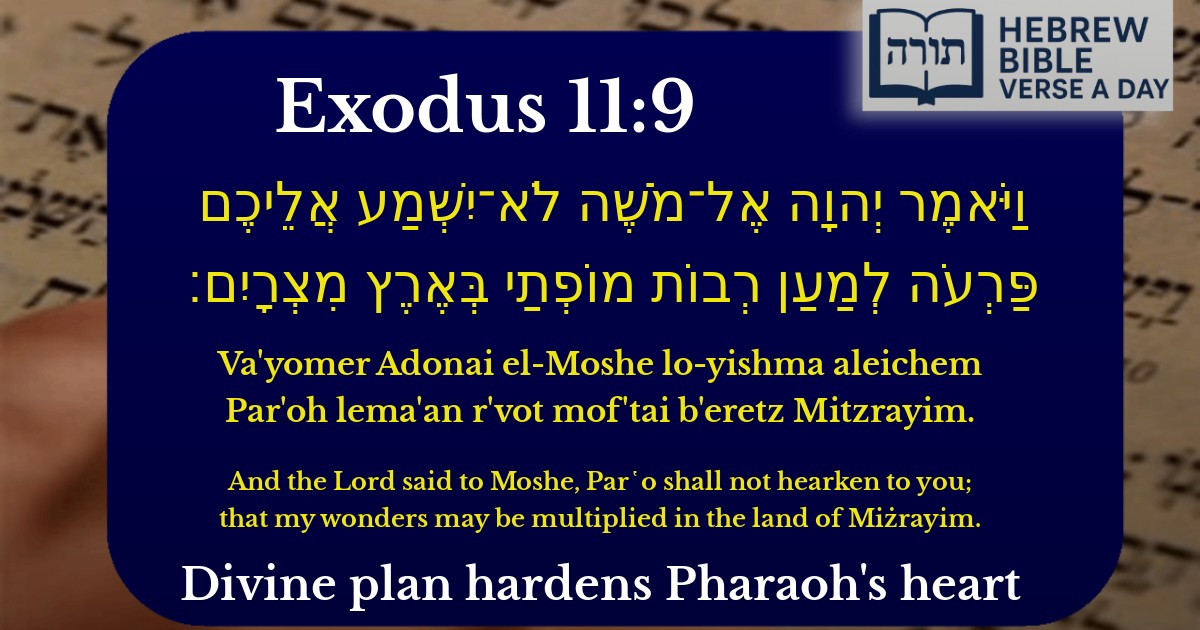Join Our Newsletter To Be Informed When New Videos Are Posted
Join the thousands of fellow Studends who rely on our videos to learn how to read the bible in Hebrew for free!
Hebrew Text
וַיֹּאמֶר יְהוָה אֶל־מֹשֶׁה לֹא־יִשְׁמַע אֲלֵיכֶם פַּרְעֹה לְמַעַן רְבוֹת מוֹפְתַי בְּאֶרֶץ מִצְרָיִם׃
English Translation
And the Lord said to Moshe, Par῾o shall not hearken to you; that my wonders may be multiplied in the land of Miżrayim.
Transliteration
Va'yomer Adonai el-Moshe lo-yishma aleichem Par'oh lema'an r'vot mof'tai b'eretz Mitzrayim.
Hebrew Leining Text
וַיֹּ֤אמֶר יְהֹוָה֙ אֶל־מֹשֶׁ֔ה לֹא־יִשְׁמַ֥ע אֲלֵיכֶ֖ם פַּרְעֹ֑ה לְמַ֛עַן רְב֥וֹת מוֹפְתַ֖י בְּאֶ֥רֶץ מִצְרָֽיִם׃
וַיֹּ֤אמֶר יְהֹוָה֙ אֶל־מֹשֶׁ֔ה לֹא־יִשְׁמַ֥ע אֲלֵיכֶ֖ם פַּרְעֹ֑ה לְמַ֛עַן רְב֥וֹת מוֹפְתַ֖י בְּאֶ֥רֶץ מִצְרָֽיִם׃
🎵 Listen to leining
Parasha Commentary
📚 Talmud Citations
This verse is quoted in the Talmud.
📖 Sanhedrin 111a
The verse is referenced in a discussion about Pharaoh's stubbornness and the purpose of the plagues in Egypt.


Divine Purpose in Pharaoh's Stubbornness
The verse (Shemot 11:9) states that Hashem informed Moshe that Pharaoh would not listen to him, in order to multiply miracles (moftim) in Egypt. Rashi explains that this was part of a divine plan to demonstrate Hashem's absolute power over creation and to punish Egypt measure for measure (middah k'neged middah). Since Pharaoh hardened his heart initially (Shemot 7:13-14), Hashem allowed this stubbornness to continue, ultimately bringing more plagues upon Egypt.
The Concept of "Moftim" (Wonders)
Rambam (Moreh Nevuchim 3:36) discusses how the plagues served as moftim—not merely punishments, but supernatural demonstrations designed to:
Free Will vs. Divine Decree
The Mechilta (Bo 13) addresses the theological question of Pharaoh's free will being removed. It explains that after Pharaoh repeatedly chose evil, Hashem allowed his heart to harden as a form of divine justice. The Sforno adds that this was to give Pharaoh and Egypt full exposure to the totality of Hashem's power, leaving no room for doubt.
Educational Purpose for Future Generations
The Midrash Tanchuma (Va'era 14) emphasizes that the multiplication of miracles served as an eternal lesson. By recording these events in the Torah, future generations would recognize: